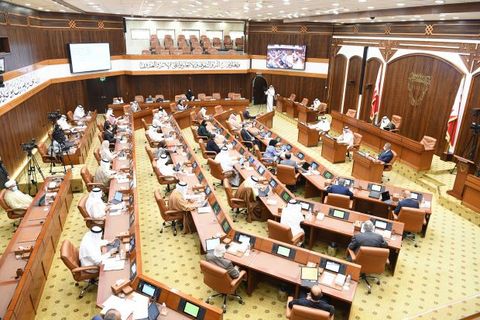Instalment payment plans clamp agreed

A NEW law regulating the sale of products to customers ‘on the never-never’ instalment payment plans was approved unanimously by the Shura Council yesterday.
Under the law, traders without a proper licence, or charging highly-inflated prices for the service, could face up to a year in jail and fines of between BD1,000 and BD5,000, or both.
Member Dr Abdulaziz Abul claimed that several instalment defaulters who bought cars have seen them disappear from their doorsteps a day after due payments were missed.
“Cars are a necessity and a lot of people cannot afford to pay the full amount for even the cheapest vehicle in the market,” said Dr Abul.
“This is why they are forced to buy on instalments, under high interest rates.
“However, people may have to deal with unexpected budget constraints during certain months, financiers or sellers don’t care about that. When the due payment is missed, the car is whisked away to a warehouse and later sold to someone else. At times, this is done despite the buyer having paid two-thirds of the instalments.”
Dr Abul said the new law clearly stipulated the rights of sellers and consumers.
“Due to financial commitments, consumers are always at a disadvantage with a phone that costs BD300 being sold for BD1,000 on instalments,” he pointed out.
“The new law aims to strike a balance – while sellers should make a decent profit, they should not take undue advantage of people or exploit their unfortunate circumstances.”
His sentiments were echoed by member Fouad Al Haji, who claimed that most consumers sign on multi-paper agreements without reading the clauses as they are often desperate to buy the product.
“Some of the clauses are deliberately given in small letters and cannot be read even with a magnifying glass,” said Mr Al Haji.
“This is why a car bought on instalment disappears the next day. The supplier retains a spare key, should the buyer default on payments. Sometimes, the pending amount is just two months of instalments and yet the vehicle is seized.
“Even if people read through the agreements, most of the terminology is legal and no-one understands it. They sign the papers hoping to fulfil the obligations in due time.”
A number of members sought to refer the law to the Supreme Council for Islamic Affairs for Sharia compliance, but second vice-chairwoman Jameela Nusaif said it was on the same lines as that implemented in Saudi Arabia.
Financial and economic affairs committee chairman Khalid Al Maskati said contractual agreements generally lacked details.
“The agreements don’t state the actual price of a product or the interest rate adopted to calculate instalments,” he said.
“Court verdicts are issued on the total bill, as mentioned in the contract, even if the product sold is much lower in market value – should the consumer face difficulty in making the payment at any stage.
“This law aims to regulate the instalment procedure and ensure that items are not sold for inflated rates.”
The legislation, which will be drafted as a bill by the government, has been proposed by five members led by Dr Bassam Albinmohammed.
Meanwhile, the Justice, Islamic Affairs and Endowments Ministry told the committee that court rulings have been issued in 2,447 cases of debts resulting from unpaid instalments, while 6,516 more are awaiting verdicts.
The Industry, Commerce and Tourism Ministry had earlier welcomed the law, telling the committee that regulating the instalment payment practice was vital to protect trade.
However, the Central Bank of Bahrain told the committee that the law would disrupt businesses.
‘On the never-never’, a system of payment in which part of the cost of something is paid immediately and then small regular payments are made until the debt is reduced to nothing, is popular all over the world, although similar concern is often voiced over the higher price having to be paid for taking up the option and the risks if installments are not covered as agreed.
Shura chairman Ali Saleh Al Saleh questioned why government officials didn’t show up for the debate on the law. Parliament and Shura Council Affairs Minister Ghanim Al Buainain said official opinion would be presented when the law gets drafted.
Source: https://www.gdnonline.com/Details/991893/Instalment-payment-plans-clamp-agreed


